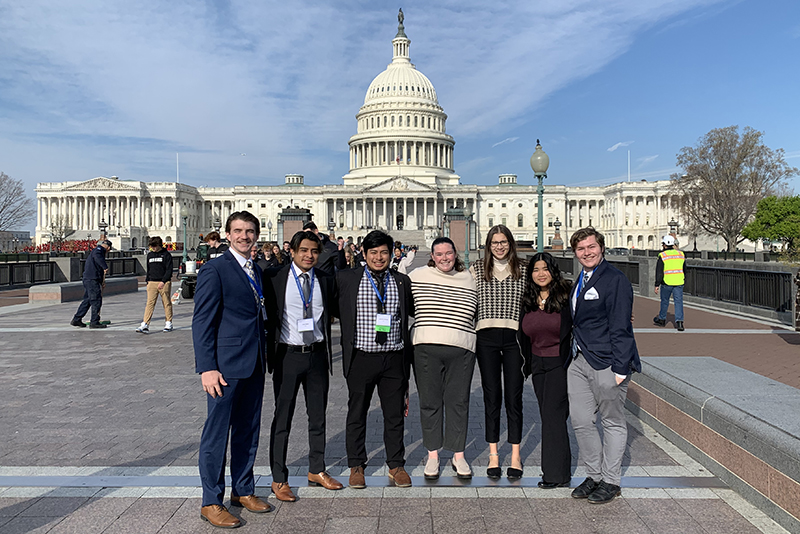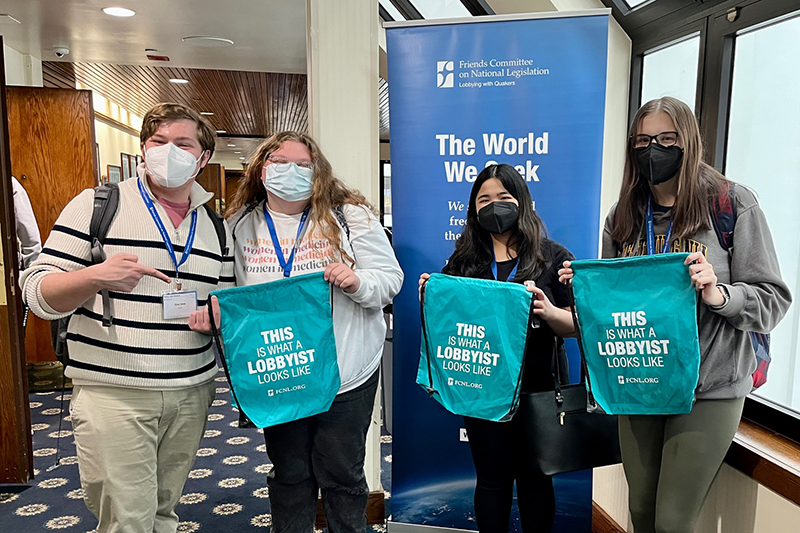Students get hands-on education in D.C.
Sixteen students involved in Washington College anthropology, political science, civic engagement, and Presidential Fellows programs met with Congressional representatives during Spring Lobby Weekend.

On the final day, Washington College students joined with students from other institutions to speak with their representatives in Congress from their home districts.During the spring semester, a new co-curricular activity provided a clear example of the campus-wide interest and investment in facilitating the civic engagement of students and faculty. Faculty members connected interested students to an opportunity to learn directly from people working in political advocacy, to make their own impact while still in school, and to build skills that will allow them to be effective citizens throughout their lives.
Emily Steinmetz, associate professor and chair of the Department of Anthropology & Archaeology, had admired the Friends Committee on National Legislation's Spring Lobby Weekend program even before joining the Washington College faculty. This past year, she and Carrie Reiling, assistant professor of political science and international studies, were looking for high-impact opportunities to keep the social justice interest group of the Presidential Fellows engaged, and the Spring Lobby Weekend seemed like it would be a good fit.
“Friends Committee is very much dedicated to empowering young people to make change, often through policy channels. That's what they're good at doing,” Steinmetz said, adding that many of the people running the Spring Lobby Weekend provide a direct way for students to see themselves in politically engaged work. “A lot of people they hire are young people, so it's really a great place for college students. They can see the power that young people can have when they have the skills and knowledge and access.”
The Spring Lobby Weekend also provides a structure for hands-on learning about how to advocate for a cause at the Congressional level. Steinmetz, Reiling and Thomas V. Mike Miller Director of Civic Engagement Pat Nugent saw an interest among students to learn about how to engage in the process. The professors began to consider who might be most interested and benefit from the experience, which included four days in Washington, D.C., three for training on a specific issue and how to effectively lobby, concluding with a final day that participants spent on Capitol Hill, putting their newfound expertise to use with their Congressional representatives. They obtained generous funding from the Holstein Program in Ethics and the Goldstein Program in Public Affairs that would cover travel and lodging costs, allowing students to join the trip regardless of their personal finances.

Three days of training included plenary speakers like Congressman Jim McGovern (MA-02), the Ranking Member of the powerful House Rules Committee, and breakout sessions students could choose to attend that focused on particular affinity groups or topics, like getting young people into elected office or how to work with the media.Ultimately, Steinmetz, Reiling and Nugent offered the opportunity not only to the Presidential Fellows, but also to all anthropology or political science majors, as well as those working with Nugent at the Starr Center for the Study of the American Experience through initiatives like the Student Leaders in Civic Engagement group that the Starr Center launched this year.
Dylan Snow '23 fit several of those categories, a double major in both disciplines who has also worked throughout his time at Washington with Nugent, someone Snow calls “a mentor in many ways over the past few years.”
Snow joined 15 other students from the College who traveled to Washington, D.C., for the Spring Lobby Weekend, plus three who joined remotely just for the training sessions. He said that classroom discussions about issues and making change can be abstract, but the weekend provided a new way to learn another side to how policy gets made in the United States.
This year's Spring Lobby Weekend was built around advocating for federal funding for violence interrupters, community members employed to de-escalate conflict. And while it was not a topic Snow had previously known about, it was a cause he embraced. And he, Steinmetz and Reiling all agreed that the topic was a way to learn about the process of advocacy and build skills that could be applied later in service to any cause students feel strongly about.
“I'm very interested in advocacy and social justice. It was a hands-on opportunity to learn about an issue and to make a little bit of an impact. And learn about how to make an impact,” Snow said. “Experiential learning is a big part of why I came to Washington College. So Spring Lobby Weekend was very much the culmination of that.”